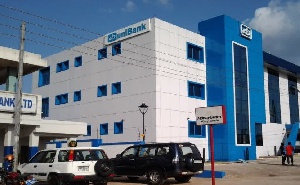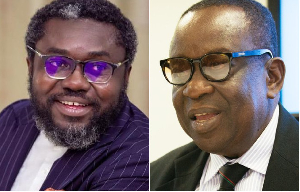The accused persons in this matter have been charged with fraudulent breach of trust, money laundering, dishonest appropriation, wilfully causing financial loss to the Republic and conspiracy to commit crime.
The 1st Prosecution witness (Nii Amanor Dodoo), the Receiver of Unibank, has concluded his evidence-in-chief. Counsel for the 1st, 2nd, 3rd, 4th and 5th accused persons have concluded their cross-examination of the Receiver.
At the time the license of Unibank was revoked, it was discovered that an amount of 5.7 billion cedis had been dishonestly appropriated by the shareholders with the connivance and assistance of some of the accused persons.
At the last court date, Counsel for Elsie Dansoa Kyere, (6th accused), the Executive Head of Corporate Banking of Unibank at the time of the revocation of its license also concluded his cross-examination of the Receiver.
The Receiver informed the Court that fictitious loans were originated by the 6th accused person and one Benjamin Ofori, a former Executive Head of Credit Risk of Unibank (the 8th accused).
This was done through memoranda that were channeled through Jeffrey Amon, a former senior Relationship Manager of Corporate Banking (7th accused) for approval from 4th accused (Kwabena Duffour II) and 5th accused (Ekow Nyarko Dadzie-Dennis).
The Receiver stated that these loans in question were neither channeled through the Management Credit Committee, Executive Committee nor the Assets and Liabilities Committee.
These loans, according to the Receiver, were fictitious because they were made in the names of persons who did not request that those accounts to be opened. He added that ordinarily, when loans are approved, the proceeds go to the customer.
The proceeds of these fictitious loans were rather credited to the Deferred Expenditure Account. He added that the accounts of the customers listed in the memoranda were all fictitious since they were not the regular account numbers of those customers. The memoranda requested for credit facilities to be disbursed into these fictitious accounts.
The Receiver further informed the Court that this request by the 6th, 7th and 8th accused persons, seeking the approval of the 4th accused (Kwabena Duffuor II) and 5th accused (Ekow Nyarko Dadzie-Dennis) was wrong because the amounts involved could only have been approved by the board of Unibank.
The Receiver explained that the management of the bank in the review of their monthly management accounts were able to determine the actual profit or loss made. This was then compared to the profit indicated in their prepared budget.
On this basis, they then determined how much loans should be generated to create interest. These loans were backdated so the bank’s system would generate and post the interest generated into the interest income account.
The Receiver informed the Court that the shareholders of Unibank siphoned funds from the bank. This was charged against the Deferred Expenditure Account. Since this account did not yield interest, they had to find a way of creating loan accounts that would generate interest.
According to the Receiver, these fictitious accounts were created to generate interest income and to present a situation as though Unibank was operating profitably and close to the budget they had set. The Receiver added that the fictitious loans were also created to conceal money siphoned from the bank by shareholders.
He added that the 6th accused played a significant role in this through the initiation of memoranda together with 7th and 8th accused persons. They did this with the approval of the 4 th and 5th accused persons. By this, they significantly misstated the financial statements of Unibank.
The Receiver explained there were meetings during which the plan to create the fictitious loans and generate fictitious interest income was hatched. At these meetings, the customers in whose names the fictitious loans were to be created were identified and the interest rates to be applied agreed on.
He added that the tabulation of the financial gap that needed to be filled was prepared and based on this, the quantum of loans that needed to be created were determined and signed off on. This formed the basis on which entries were subsequently passed.
The Receiver informed the Court further that his team was informed by officials of the Finance Department of Unibank that this whole plan was arranged by the 4th, 5th, 6th, 7th and 8th accused persons.
He explained that because of the sensitive nature of these transactions, the originating documents were retrieved from the Finance Department after the entries were passed.
He added that an official of the Finance Department who believed that the entries which were being passed would create problems someday hid one of those documents which he shared with the Receiver’s team.
The Court was informed that the financial statements of Unibank did not show the actual position of the Deferred Expenditure Account. He added that his team was informed that the balances on this account were intentionally excluded from the financial statements and the returns submitted to the Bank of Ghana.
The 4th, 5th, 6th, 7th and 8th accused persons concealed the balances on the Deferred Expenditure Account by creating the fictitious loans. According to the Receiver, the deliberate attempts to conceal the magnitude of those transactions and failure to report the balances on the financial statements and actually transferring some of these funds to the fictitious accounts was wrong.
The Receiver informed the Court that the shareholders of Unibank accepted responsibility for the funds siphoned from the bank. He indicated that the shareholders initially offered to hand over assets purchased with those funds. They later proposed to set up a special purpose vehicle to house those assets and to use the special purpose vehicle to secure loans to reimburse the bank.
The shareholders, according to the Receiver, offered to seek loans directly to pay back the siphoned funds. All these proposals, the Court was informed, were yet to materialize.
The case was adjourned to 18th and 19th April 2023.
Watch the latest edition of BizTech and Biz Headlines below:
Business News of Friday, 31 March 2023
Source: www.ghanaweb.com













